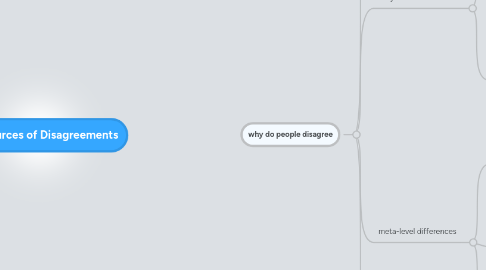
1. why do people disagree
1.1. objective differences
1.1.1. using language of logic...
1.1.2. different definitions: people are talking about different things
1.1.3. invalid arguments: there is an objective error in reasoning somehwere
1.1.4. valid but unsound arguments: premises are objectively wrong
1.2. subjective differences
1.2.1. different beliefs
1.2.1.1. belief = psychological state to which someone holds a proposition to be true
1.2.1.2. beliefs correspond to prior probability in Bayesian statistics
1.2.1.3. beliefs can be based on hereditary biases or experience
1.2.1.4. beliefs can be rational or irrational
1.2.1.5. beliefs can be inconsistent (that's the norm; making beliefs consistent is computationally hard)
1.2.2. different preferences
1.2.2.1. cost / values = numerical measure by which we rank preferences
1.2.2.2. same variations as for beliefs: hereditary / experience, rational / irrational, consistent / inconsistent
1.3. meta-level differences
1.3.1. pay-off and meta pay-off
1.3.1.1. arguments themselves usually involves some soft of cost/benefit analysis
1.3.1.2. arguments also themselves have a pay-off: look smart, get someone to act some way
1.3.2. deceit
1.3.2.1. assumptions: arguments are about objective truth
1.3.2.2. reality: arguments are about achieving one of many possible goals
1.3.3. emotional influence
1.3.3.1. cause people to act in a certain way independent of the logic of the argument itself
1.3.3.2. often achieved via "framing" and "dysphemism"
1.4. summary
1.4.1. understanding of arguments and subjectivity connects closely with forms of reasoning in AI
1.4.2. logic, Bayesian inference = objective differences between individuals
1.4.3. prior probabilities, cost functions = subjective differences between individuals
1.4.4. game theory = understanding deceit, rhetoric, etc.
2. points to keep in mind
2.1. subjective differences are inevitable
2.1.1. people are biologically different in terms of risks and preferences
2.1.2. mathematically, there is no reason to prefer one set of priors and cost functions to another
2.1.3. empirically, some choices of priors and cost functions survive evolutionarily, but such choices are not stable over time
2.1.4. e.g., priors and cost functions corresponding to altruism and cooperation are good sometimes and not good at others
2.2. subjectivity impacts arguments
2.2.1. you cannot be totally objective even if you try
2.2.2. reasoning and arguments are always influenced by subjective beliefs, often unconsciously, even if you try to avoid such influence
2.2.3. subjective differences can be altered by rhetoric and empathy, but not logic
2.2.4. framing and non-neutral language can influence subjective beliefs
2.3. assumptions about subjectivity
2.3.1. in arguments, people frequently make assumptions about their own objectivity and the biases of others
2.3.2. generally, insufficient allowance is made for the possibility that differences in conclusions are due to differences in valid beliefs or valid cost functions
2.4. labels and stereotypes
2.4.1. group membership, labels, and stereotypes often influence assumptions about bias in others
2.4.2. some labels give you valid information about someone's beliefs, premises, and biases; others do not
